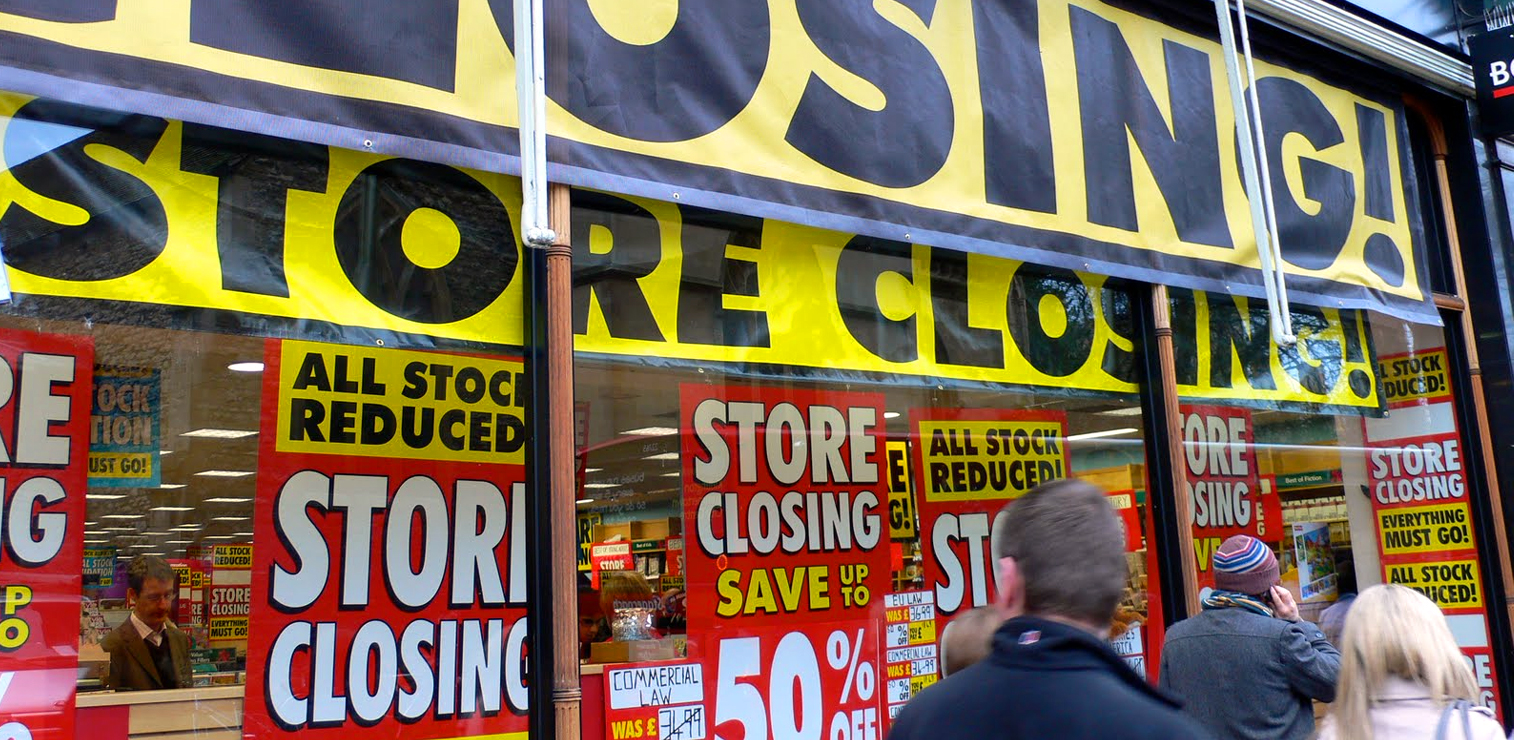You have likely already noticed the impacts of what has been darkly dubbed America’s “Retail Apocalypse”: Half-empty strip malls, brightly-colored signs announcing closing sales, or maybe your once-favorite department store has declared bankruptcy.
Whatever you’ve seen, it’s only going to get worse, according to a comprehensive report from Bloomberg, implying certainty in the fall of the retail industry as more than just sensational news headlines.
U.S. retailers announced more than 3,000 store openings in the first three quarters of this year, but that’s coupled with 6,800 chain store closures. All while consumer confidence levels are high and unemployment is low, and the economy keeps growing – a mix you’d think would be conducive to retail growth and strength.
However, more and more retail chains are filing for bankruptcy and financially distressed. This has caused an increase in the number of delinquent loan payments from malls and shopping centers containing said retailers.
So what’s the deal?
No, it’s not because Amazon.com is taking over the world (yet) or because millennials would rather travel than buy more “stuff.”
The primary cause for the retail apocalypse is not buying habits, it is that many failing retail chains are overloaded with debt.
There are billions of dollars tied up in the borrowings of troubled stores, and that strain is going to become even harder for the market to handle.
The impact of retail’s crash and burn will be felt across the country and economy. Low-income workers will be displaced, local tax bases will shrink, and investor losses on stocks, bonds, and real estate will grow.
In a nutshell: It’s only going to get worse.
Until recently, retailers avoided bankruptcy by refinancing their debts. However, as the market has evolved, lenders have become less forgiving, according to the Bloomberg report.
Additionally, an overwhelming amount of risky retail debt is coming due within in the next five years. For example, teen costume jewelry chain Claire’s Stores, Inc. has $2 billion in borrowings that will start maturing in 2019 – and it still has 1,600 stores open in North America.
In fact, $100 million of high-yield retail borrowings are set to mature this year alone and that will jump to $1.9 billion in 2018, according to Fitch Ratings Inc. data cited by Bloomberg. Between 2019 and 2025, that figure will expand to an annual average of almost $5 billion.
And, while the demand for refinancing increases, credit markets are tightening. Thus far, retailers have delayed their doom thanks to the money the Federal Reserve has pushed back into the economy since the Great Recession. Low interest rates made the risker retail debt (and the higher return it brings) more appealing. But now as the Feds raise their benchmark interest rates, that demand will decrease.
Then there’s the matter of store credit cards. The largest private-label card issuer, Synchrony Financial, has already increased reserves in order to help cover loan losses this year. Citigroup, Inc. has reported declining rates on retail portfolios, too. Why? Because shoppers are more likely to stop paying back their retail card debt if the store they went to has closed.
As all this compounds, it could directly impact the industry that employs the largest number of Americans who are at the low end of the income scale. According to Bloomberg’s research, salespeople and cashiers in this industry totaled a whopping eight million. Since our last financial crisis, employment rates have been steadily increasing, even in the retail industry. Until this year, that is. Retail store jobs have decreased by 101,000 this year so far, no thanks to store closures.
Many of the largest U.S. retailers (think Target and Walmart) have decided to reduce their brick-and-mortar space. Sure, the e-commerce boom has taken a toll, but the U.S. has been considered “over-stored” ever since investors poured money into commercial real estate as the suburbs boomed decades ago, which began an era of big box stores.
It’s time for that boom to bust.
At the end of Q3, 6,752 U.S. retail locations were scheduled to close, excluding grocery stores and restaurants, according to the International Council of Shopping Centers. That’s more than double the 2016 total and inching close to the all-time annual high of 6,900 recorded in 2008, the midst of the recession.
Clothing stores have taken the hardest hit, as 2,500 locations are closing. Department stores aren’t faring well, either. Macy’s, Sears and J.C. Penney are all downsizing.
Overall, about 550 department stores plan to close their doors.
This really does sound apocalyptic, doesn’t it?
The consumer impacts of what’s to come will be widespread. Ohio, West Virginia, Michigan and Illinois have been some of the hardest hit so far, but other states will feel the burn, too. Florida, for example, relies on retail salespeople more than any other state, according to Bureau of Labor Statistics cited by Bloomberg.
Insert a grimacing emoji face here.
I think Charlie O’Shea, a Moody’s retail analyst for Moody’s, summed up the retail industry’s prospects impeccably at the end of Bloomberg’s report: “A day of reckoning is coming,” he said.
Sienna is a Staff Writer at The American Genius and has a bachelor's degree in journalism with an emphasis in writing and editing from the University of Wisconsin Oshkosh. She is currently a freelance writer with an affinity for topics that help others better themselves. Sienna loves French-pressed coffee and long walks at the dog park.










































Paul O'Brien
December 4, 2017 at 1:43 pm
As is what’s happening with many other industries, retail’s reckoning will come and through it retailers will wake up to the fact that what people are willing to pay for is experiences.
What the heck does that mean in this context??
I’m not going to drive and shop at a local retailer to get the exact same plastic junk or $5 shirt that I can get Amazon to send to me in an hour.
But let’s not neglect that people like to shop – as an activity or social experience. Shopping isn’t just about consuming the things we want or need – it’s a matter of what it has always been in certain contexts: an experience to see products, hang out with friends, or just spend some time doing something you enjoy.
The reckoning is in the price competitive stores pushing commodities, aggressive Sales pressure (autos), and regularly purchased products. There is no market for a store front for those things.
But what we might be excited about that could thrive are the experiences we enjoy: Local artists and products, food & beverage, specializations in innovative goods (tech, apparel, autos), etc.
“Clothing stores have taken the hardest hit, as 2,500 locations are closing. Department stores aren’t faring well, either. Macy’s, Sears and J.C. Penney are all downsizing.”
— Yeah… because I don’t need to drive, park, and deal with the awful layout of a big box store just to get the same pair of jeans I’ve been buying for the last 20 years.
Pingback: Return policies are getting more strict, so act quickly
Pingback: Worker badges track location, posture, potty breaks, and more – DeepInvesting
Pingback: Pandemic claims another victim: Godiva to close brick and mortar stores